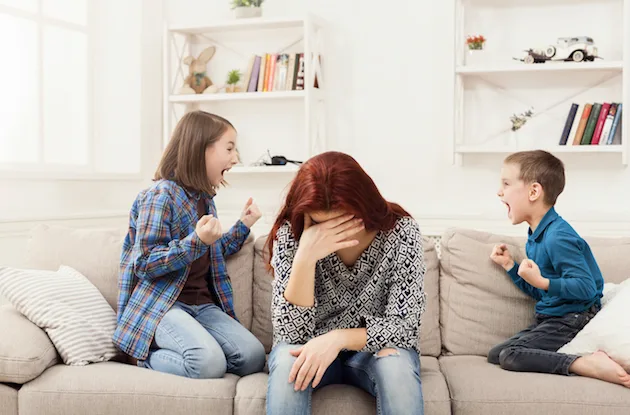Sarah Ockwell-Smith is a parenting expert and founder of gentleparentinginternational.com. She recently published Gentle Discipline: Using Emotional Connection—Not Punishment—to Raise Confident, Capable Kids.
What are some misconceptions parents have about disciplining their kids? There are three main misconceptions parents have around child behavior and discipline. One, far too many parents expect children to act like adults. They expect quite sophisticated thought processes and neurological regulation that children just don’t have yet because their brains are not fully developed. A good example is expecting a toddler to not tantrum or to be able to calm down in the middle of a tantrum. Toddlers tantrum because they have really poor emotion regulation skills. They can’t control their emotions like we can as adults—they’re not being naughty, just being toddlers! Two, most mainstream discipline methods work on the presumption that kids need to be motivated to “do better.” In fact, most kids are motivated to do better. They don’t want to get in trouble or upset you. Most misbehave because they can’t do better. The motivation is there already, it’s the ability that is missing. Three, another problem with mainstream discipline is, it focuses strongly on punishing and shaming kids. The thing is, a major cause of poor behavior is a lack of self-esteem in kids. If they feel bad, they’ll act bad.
What tips do you have for parents when they feel they are about to lose their temper? I think it’s important that we have realistic expectations of our own behavior. Everybody screws up as a parent and everybody loses their temper sometimes, including myself. Stop trying to be perfect. Accept that anger and losing control are normal parts of life as a parent and it doesn’t mean that you’re not good at it! What is important is keeping a check on your own emotions. Being mindful of how you’re feeling, trying to reduce triggers and taking a break to recharge when you feel frazzled. When you feel that you just can’t take any more, you need an emergency break from your kids. Maybe a day with friends, going for a run—whatever it is that replenishes and relaxes you.
What’s your take on “time-outs?” Time-outs work on the idea that separating the child from yourself and their peers punishes them for their wrongdoing and makes them think about what they’ve done wrong. This time in quiet contemplation is meant to make the child behave more appropriately next time. Unfortunately, none of these assumptions are true. Young kids don’t have the brain development for such sophisticated thought, they don’t have a developed sense of empathy, they can’t think about future actions, and they can’t control their behavior anywhere near as much as adults think they can. Another huge problem with time-out is, kids often misbehave because they feel a disconnect with their caregivers. It makes no sense that a child who is desperate for love and attention is further separated—it just makes them feel worse, which in time will make their behavior problems escalate.
How can parents start to change old patterns of yelling at their kids? You have to start with revisiting your childhood and trying to become mindful about your own parenting skills. So often we discipline subconsciously, by that I mean we just repeat the discipline our parents used without really thinking about it. Our reactions are very often memories of our past, not a really mindful look at the current situation. Being aware of your propensity to yell is really important. I’m a huge yeller by nature, my mother yelled at me as a kid and if I don’t keep my actions in check then my default setting is to yell at my kids. When you feel a yell coming on, try to take a pause and ask yourself “why am I doing this? what is it going to achieve? is there a better way I could respond?”. I think though, that’s it’s important to not be too hard on yourself. It’s not realistic to set a goal of never yelling, you won’t achieve it and you’ll give up. Instead, think to yourself “I’m going to reduce my yelling by 50% each day”, which is a fantastic start!
My kid refuses to clean his room. What do you suggest? First of all, I think we need to understand that no kid likes cleaning their room. Most adults don’t either. So you have to start from a position that it’s a necessary task, but it’s not fun. A lot of empathy towards your kid there is important. Have conversations saying “I know you don’t want to do it, I hate it too – but do you know why it’s important?”. Showing them clips of dustmites and bacteria can help them to understand hygiene. Think of ways to give the child control over the cleaning and tidying – e.g “OK, so your room needs to be done, do you want to do it on Saturday or Sunday? Morning or afternoon?”. Too often kids have no control, they’re just told to “do your room now”. Next think about making it fun. Put on some loud music, do a silly dance, since a song you make up, have a race for who can tidy an area quickest. Join in with them if you can. Finally, and perhaps most importantly, you have to remember that you are your childrens’ role model. If you want them to keep their room tidy and clean, you have to keep your rooms tidy and clean. If you’re messy, you’re going to raise messy kids. That’s not their fault – they’re just copying you!
REALTED:




















